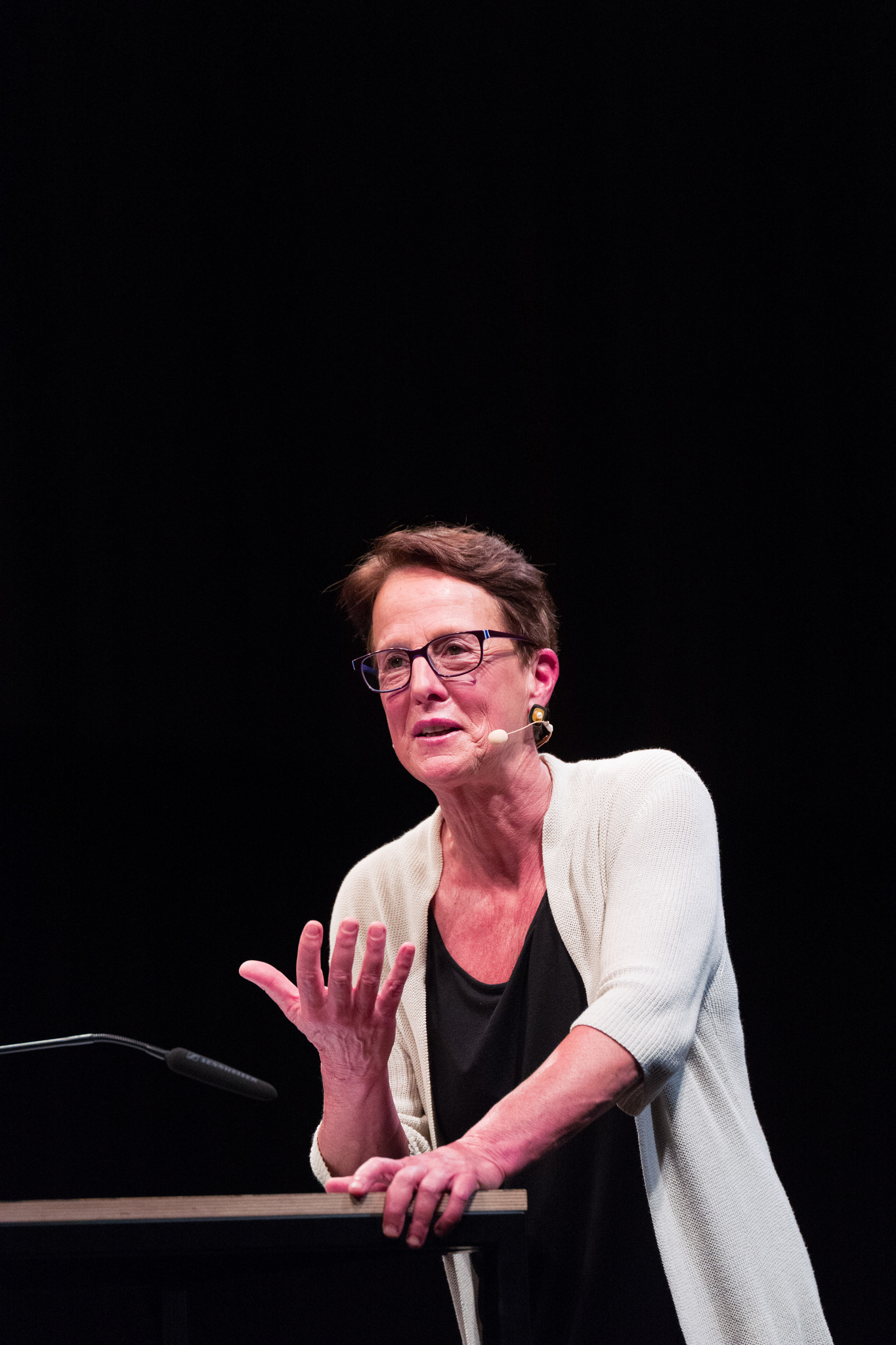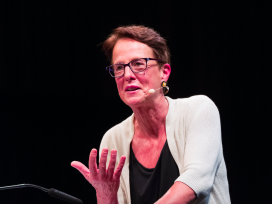
Image: Santiago Engelhardt, www.santiagoengelhardt.de
Joe Littler: In Undoing the Demos, you examine how neoliberalism’s rationalities ‘disembowel active citizenship’, or the rule of the people by the people. How have these rationalities extended and mutated since you wrote the book, in the era of Trump?
Wendy Brown: One of the things I paid too little attention to in Undoing the Demos was the disintegration of the social, something Britons have been very familiar with ever since Thatcher declared that ‘there’s no such thing as society’. In the American case that disintegration has had two important effects. First, this process literally takes apart social bonds and social welfare – not simply by promoting a libertarian notion of freedom and dismantling the welfare state, but also by reducing legitimate political claims only to those advanced by and for families and individuals, not social groups generated by social powers. Second, something I didn’t emphasise adequately in 2015 but would now stress, is the extent to which neoliberalism could generate a political formation that combined libertarianism with a very strong statism that works to secure, essentially, the deregulated public sphere that neoliberalism itself generated.
As a libertarian order of freedom is unleashed and legitimated, it attacks social bonds and obligations, social conscience, and social welfare. It disintegrates society and disinhibits individuals. This in turn produces the need for strong authority to secure order, to secure boundaries, to secure against what a declining middle and working-class experiences as ravaged ways of life for which it blames ‘others’: immigrants, minority races, ‘external’ predators and attackers ranging from terrorists to refugees.
Despite some resonances with 1930s fascism, this libertarian authoritarianism is a novel political formation, one, as I’ve suggested, that is an inadvertent effect of neoliberal rationality. It’s a formation that I think should not just be reduced to the idea of fascism or populism. Its sensibility is: ‘I can say anything, do anything, be anything I want, I can call for a certain restoration of my former entitlements (among whites), insist on my libertarian rights and at the same time demand statist protection of my country, property, and racial and sexual entitlement.’ But in addition to what this formation features, it’s important to note what it omits.
What’s missing is any reference to or care for democracy. It’s quite striking that you don’t get from Le Pen or Farage or Trump any talk of democracy at all. You get law and order, you get statism, you get nationalism, you get restoration of white entitlement through nativism from extreme right politicians. But reference to democracy (other than to make it a stand-in for nationalism or patriotism) is very, very rare. What brings someone like Trump to power was the combined emphasis on (non-democratic) liberty and authority; on both statism and the right to say, feel and do whatever one wants. Again, this is a peculiar political formation that we’ve not had before and that we should not reduce to or equate with older forms of authoritarianism, populism or fascism.
You’ve argued recently that ‘Trump’s rise is nothing but neoliberalism’s effects’. Can we also understand Trump as a kind of neoliberal nationalism?
Yes. Many people think: well, how can this be neoliberalism if it involves calling for markets that are regulated or protected by nation states? How can the renegotiation of trade and tariff agreements like NAFTA, Brexit and other forms of economic protectionism be neoliberalism? Here we need to recognise that neoliberalism has never been one cogent, coherent doctrine. It’s had many iterations, including the difference between its theoretical founding formulations in Hayek and Friedman and the Ordoliberals, and the way it was actually rolled out in practice by Reagan and Thatcher in the Global North, and Pinochet and others in the Global South.
There’s also a difference between the iteration of neoliberalism in the 1980s and its quite dramatic shifts through financialisation when it gains financial semiotics, coordinates, imperatives and vicissitudes. It’s perfectly possible to continue the basic planks of neoliberalism – privatisation, dismantling whatever is left of the welfare state, slashing away at taxes for the rich and for corporations, keeping capital the centre of state concerns – while, at the same time, producing new regional domains of protectionism or rebellions against the EU or NAFTA. We are not ‘over’ neoliberalism just because we are ‘over’ a certain kind of right-wing alliance with globally de-regulated trade. There’s a reconfiguration going on and it’s important to see the extent to which the right has not rebelled against neoliberal reason or doctrine but only certain effects. Neoliberalism is being reiterated … again.
When Trump was elected, Cornel West said that ‘The neoliberal era in the United States [has] ended with a neofascist bang’. But, as you’ve just argued, neoliberal rationality hasn’t ended. Can you can say more about the parallels, connections and disconnections between neoliberal rationality and twentieth-century fascism?
First, I appreciate why Cornel is saying what he is saying. He is marking the extent to which rising white nationalism, white supremacism, masculinism – all kinds of values that have been brewing and boiling for decades but got put on steroids during the Obama years – have exploded onto the mainstream political stage. Not only in the form of Trump and a plethora of European white nationalist leaders, but also in the form of emboldened and empowered social movements.
The reason I am arguing that this is a development of neoliberalism is: the legitimation of those white supremacist energies itself comes from the neoliberal attack on the social, which includes an attack on equality, social belonging and mutual social obligation, and also an attack on the replacement of traditional morality and traditional hierarchies (including racial hierarchies) by social justice and social reform. This strand of neoliberalism, this attack on equality and social justice, shapes and enables a white supremacist reaction to the ‘dethroning’ of whites that itself is a neoliberal economic effect (the result of globally unleashed capital, the outsourcing and de-industrialisation of the north, etc.). If that white supremacist reaction is labelled fascism, it’s easy to think we’re just having a sudden eruption of hatefulness and activation of people with already existing fascist sensibilities. In fact, most of these people, these white supremacists, are using the word ‘freedom’ in the beginning, the middle and the end of their sentences. In their mind, a liberal or social-democratic agenda that promotes equality means promoting the interests of refugees, of blacks, of women, of others, above them, because equality and, worse, affirmative action, have replaced individual freedom.
‘Fascism’ is a shorthand that’s perhaps not quite in our service – as liberal and left intellectuals trying to understand where we are and what to do next. I think it makes more sense to understand the energies that have been unleashed as, in part, products of neoliberal deracination, displacement and disintegration. So too is white male rage an energy intensified by neoliberal reason, and the ways it has been disseminated in law and culture, not only the economy. This rage takes shape as ‘freedom’ to be a racist, a sexist, a homophobe or Muslim hater, and to push back against the ‘tyranny’ of the left that tries to outlaw this. I’m not saying that neoliberal governmentality or rationality created the rage, though neoliberal economic policy certainly orchestrates a lot of the economic suffering and cauterised futures, experienced as social castration by whites, that is fuelling it. Rather, I’m saying that this rage erupts in the form of libertarian freedom to speak and enact the power of white male supremacy against principles of equality and policies of social justice that neoliberalism itself cast as illegitimate and, worse, totalitarian.
Let’s talk about gender. How is this conjuncture gendered?
I think that many people were shocked not just by the election of Trump, but by the surprising number of white women who voted for him. Just over half of white female voters supported Trump. That’s a lot of women voting for an openly sexist, misogynist man in 2017. And not only sexist and misogynist but noxious, narcissist, infantile and boorish – really the kind of dude that hardly any woman likes. So we do not just have a problem with misogynist, masculinist, angry, socially castrated male voters; we have a problem with all kinds of white men and women bringing someone to power who speaks and conducts himself in a way that no other configuration of human could. If any black person, if any Muslim, if any queer person, if any woman, spoke just one or two of the utterances that Trump has spoken by the hundreds of thousands, that person’s political career would be over. We know that. So the boorishness, the misogyny, masculinism, and old fashioned chauvinism that Trump represents is not just ‘his’: it’s also something that is obviously still ours, that of white people. It is on white people as a whole because he survives in politics as an unrestrained figure of white male entitlement to do and say whatever it wants when no one else can. And that white male supremacy was underwritten by white women, not just white men.
So we have two problems. We have both women and men supporting this, and presumably finding the particulars of his speech and conduct towards women maybe not desirable, yet recognisable and tolerable. It’s what they live with, what they know, how boys are. And then we have the problem of a national political culture, in our case, that also tolerates this, but only in this one kind of being – only in white men.
How do we find our way out of this? I disagree with those who feel that the problem with Clinton was that she was too ardent a feminist and too affirmative of identity politics. What we’ve learnt over the last year and a half, from the Trump campaign and the presidency, is that we have both a white identity politics that’s quite fierce, and a male identity politics that’s quite fierce. It’s quite silly to say that Clinton was boosting the wrong things because that rage built on white male identity was already there, ready to destroy her. Of course there were many things wrong with the Clinton candidacy – she was a terrible candidate for the times. Not because of her identity politics, but because of her Washingtonian and Davos politics, her establishment credentials at an anti-establishment political moment.
How can we shift out of these regressive gendered dynamics?
I think the extent to which women in positions of power – positions of political, economic, and social power – have in the past year been speaking out about what it is like to be women is really important. It’s probably just as important as what we have all been doing for ages, which is teaching gender studies in schools and building social movements from the bottom. It’s also of course very different from the ‘go along to get along’ approach of many women aspiring to positions of power, and the suggestion that the only ones that complain are the radicals. What has happened in the Silicon Valley and Hollywood exposés of rampant sexual harassment and assault, and rampant second-class treatment, promotion and remuneration, and in the exposés of political life and even sports – all this is important because it develops consciousness of gender power in places and in ways that people weren’t looking at, or looking for.
On the other hand, I think we have to recognise once again that it’s not simply a matter of social progress. This is a battle. This is a war. ‘Time’s Up!’ (coming out of the #MeToo movement) is a great political slogan but isn’t true unless the fighters are out every day and everywhere to make it become true. People don’t give up powerful and privileged positions with ease or grace. We’re learning that about whiteness, and we’re learning that about maleness, anew. I mean, yes, there are some men in Hollywood and Washington who have hung their heads in public shame about what they’ve done or what they failed to do in stopping harassment or assault. But they were basically cornered into this by their milieu. And how many white cops have been publicly brought to heel by Black Lives Matter? How many men has #MeToo suddenly transformed from gropers and harassers into feminist freedom fighters? Count them on your fingers. And how many more has it sent into rage at the wrong and unfairness of it all?
We also face the problem of an increasingly sectoralised media, and an increasingly sectoralised population attached to different medias. I don’t know how we are going to get across these divides. I really don’t. I mean if you watch Fox News, or read Breitbart, let alone the Daily Stormer, or go back to Gamergate, or go into the blogs and the twitter feeds of the right, where misogyny, racism, homophobia, anti-Semitism and hatred of Muslims are regular fare, you’re left with this question: How can we affect social, cultural, political change in relationship to gender, among other things, when we are not reaching those places and when those places are reaching so many? I do think that remains a very open question.
That leads us to hope and despair, and how we navigate them. You’ve talked about how, within neoliberalism, nihilism is made into a commodity; and you’ve emphasised that we shouldn’t abandon democratic projects and actions just because they’re not yet realised. You’ve also talked about how you think there’s a distinction between hope and the construction of progressive alternatives. This is really interesting, given how important and fragile hope often is to the left, and how we talk so much about it (e.g. Raymond Williams, Resources of Hope, David Harvey, Spaces of Hope). Can you say something about these entanglements between hope and despair?
We live in such nihilistic times. By which I mean, drawing from Nietzsche, not that there are no values circulating: but that our values are commercialised, trivialised, fungible; they’re traded, trafficked in, used for branding and profit. How, in this context, can we mobilise for a different world? How little do right and left stand for more than hating each other at this point? I think that’s one reason you get so much bellicosity these days from the right, as opposed to old-fashioned conservatism, which was rooted in a world-view and a set of foundational justifications. Instead you get bellicosity, aggression, rage … and there’s plenty of that coming from the left too. I’m not equating them. But I do think we need to take the measure of what nihilism has done to political worldviews animated by deep conviction and desire for the Good.
Now, hope. Look, I don’t have a lot of hope for this world. In the face of the climate change emergency, the kinds of people that are in the major power positions in our universe – Putin, Trump, and so forth – the rise of right-wing forces, the miserable corruption and deprivation that neoliberalism has contributed to much of the postcolonial world, the massive pile up of humanity in global slums, and the seeming endurance of capitalism beyond, beyond, so far beyond when it should have given way to something else, it’s hard to have hope. I think we need grit, responsibility and determination instead of hope. We need to clean up the messes humans have made – socially, ecologically, politically. We have no choice but to try to redeem our species and make a better world than we have to date. It’s not about hope but something more like responsibility and maybe even curiosity: with our extraordinary brains and imaginations, our technologies and spirits, can’t we do better?
I think efforts at alternatives feel most possible and promising when they are very local, even small. When we work at the level of co-operatives, local ordinances, developments within our towns, or neighbourhoods, or schools. When we are able to produce differences at this level – producing renewable energy for a whole town, or converting a region from toxic to organic farming, or solving a housing crisis – we feel our capacity to live differently through collaborative efforts. I think it is most difficult to feel hopeful when one is trying to enact global transformations, for all the obvious reasons. So probably ideas and practices for transforming an order that is not sustainable for humans, the planet or all the species on it will come from local levels. I don’t think there’s some great giant, global revolution to be had. I think it’s a question of transformations that connect to one another at local levels.
One more thing on this topic: it is important to ask ourselves what we can do to produce more prospects for hope, rather than trying to find hope in order to act. I think sometimes that means, for example, transforming the lives of two or three teenagers; cleaning up a strip of coastline and gazing on its beauty; scouring the racism from a police department; working to alter ordinances that are highly punitive or cruel; or stopping (in the case of the US) the deportation of undocumented people. Those kinds of activities I think are often called ‘resistance’, which they are; but they also help generate a sense of collective human power against our routine feelings of powerlessness and isolation. These kinds of things re-enfranchise us politically and socially in a time when most people feel quite disenfranchised in both ways. So that experience of acting together in order to produce a difference in a certain political or economic setting is itself generative of hope. We can’t go looking for hope in the sky. We have to make it on earth. That’s the difference between a religious and a political attitude.
A longer version of this interview, including Wendy Brown’s account of her own intellectual formation and her reflections on the relation between theory and praxis, can be read on the Soundings webpage.








